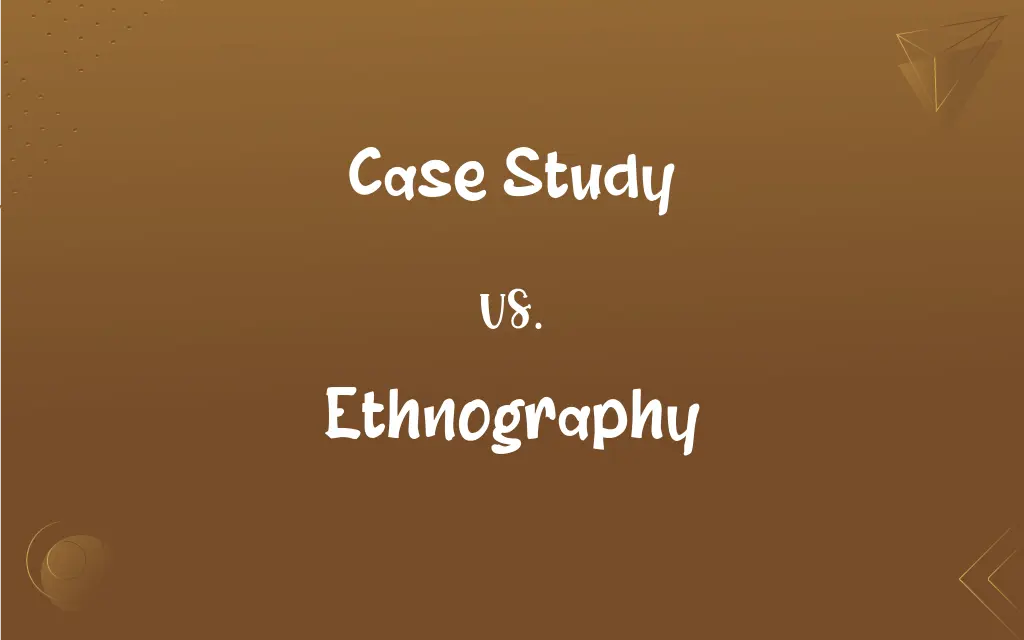Case Study vs. Ethnography: What's the Difference?
Edited by Janet White || By Aimie Carlson || Published on November 22, 2023
Case study refer to in-depth analysis of a single subject or situation. Ethnography refers to detailed study of cultures through fieldwork.

Key Differences
A case study focuses on an in-depth examination of a specific case, like an organization, event, or individual, to explore its complexities. Ethnography, on the other hand, involves the systematic study of people and cultures, emphasizing participant observation and living among the study subjects.
Case studies often utilize various data collection methods like interviews, documents, and observations, tailored to the specific case. Ethnography primarily relies on fieldwork, including participant observation and interviews, requiring immersion in the culture or community being studied.
Case studies aim to provide a detailed understanding of the case within its real-life context, often to solve a problem or to understand complex phenomena. Ethnography seeks to understand and interpret cultural phenomena from the perspective of the study's participants.
A case study typically has a narrower focus, concentrating on a particular instance or scenario. Ethnography, in contrast, has a broader scope, aiming to capture the nuances of cultural practices and social interactions within a community.
The findings from a case study are specific to the case and may not be generalizable. Ethnography, while also detailed, aims to uncover broader cultural patterns and social truths that can offer wider insights into human behavior.
ADVERTISEMENT
Comparison Chart
Focus
Specific case or instance
Culture or community
Data Collection
Mixed methods (interviews, documents)
Fieldwork, participant observation
Objective
Understand a specific case in context
Understand cultural phenomena
Scope
Narrow, in-depth
Broad, cultural
Generalization
Limited
Broader cultural insights
ADVERTISEMENT
Case Study and Ethnography Definitions
Case Study
A method of qualitative analysis where a case is explored in detail.
The case study of the local government's response to the crisis provided valuable lessons.
Ethnography
The systematic recording and analysis of human cultures.
Through ethnography, she documented the language and rituals of an indigenous tribe.
Case Study
A case study is a detailed examination of a specific subject.
The case study on Tesla's business model revealed unique strategies in the electric vehicle market.
Ethnography
A qualitative research method focusing on cultural phenomena.
The ethnography explored the social dynamics of street artists.
Case Study
A comprehensive investigation of an individual, group, event, or situation.
Through a case study, researchers uncovered factors leading to the community's resilience.
Ethnography
The study of social interactions, behaviors, and perceptions within groups.
The ethnography highlighted differences in communication styles among generations.
Case Study
An intensive study of a single unit for the purpose of understanding a larger class of units.
A case study of a successful startup can offer insights into entrepreneurial success.
Ethnography
Ethnography is the detailed study of people and cultures from an insider's perspective.
His ethnography on rural life in Japan offered deep insights into traditional customs.
Case Study
A research method focusing on a single case within its real-life context.
Her case study on urban schools highlighted challenges in public education.
Ethnography
A research method involving extended observation of a group.
An ethnography of a tech startup culture revealed unique workplace norms.
Ethnography
The branch of anthropology that deals with the description of specific human cultures, using methods such as close observation and interviews.
Ethnography
A text produced using such methods.
Ethnography
(anthropology) The branch of anthropology that scientifically describes specific human cultures and societies.
Ethnography
An ethnographic work.
Ethnography
That branch of knowledge which has for its subject the characteristics of the human family, developing the details with which ethnology as a comparative science deals; descriptive ethnology. See Ethnology.
Ethnography
The branch of anthropology that provides scientific description of individual human societies
FAQs
Are case studies generalizable?
Usually, they provide specific insights and are not intended for broad generalization.
How is ethnography conducted?
Through fieldwork, including participant observation and interviews, often living within the community studied.
Can a case study be quantitative?
While typically qualitative, some case studies can incorporate quantitative data.
What is a case study?
An in-depth examination of a specific subject within its real-world context.
How long does a case study take?
It varies, but can range from a few weeks to several years, depending on the case complexity.
What is the main purpose of ethnography?
To understand and interpret cultural phenomena from the perspective of the study's participants.
What makes ethnography unique in research?
Its immersive approach and focus on cultural understanding from an insider perspective.
What skills are needed for ethnography?
Strong observational, analytical, and interpersonal skills, with cultural sensitivity.
Can case studies be used for hypothesis testing?
They're more suited for exploratory and descriptive research, less for hypothesis testing.
Are case studies suitable for all fields of study?
They are most common in social sciences, business, and education, but can be adapted to other fields.
What is a limitation of a case study?
Its findings might not be applicable to other cases or broader contexts.
Can ethnography be done remotely?
Traditional ethnography requires physical presence, but digital ethnography is emerging.
How does a case study differ from a survey?
Case studies are in-depth and qualitative, while surveys are broader and often quantitative.
What role does language play in ethnography?
Understanding and, if possible, using the local language is vital for effective communication and interpretation.
What ethical considerations are involved in ethnography?
Informed consent, respecting privacy, and cultural sensitivity are crucial.
Can multiple cases be included in a case study?
Yes, in a multiple-case study, several cases are compared or contrasted.
How does ethnography benefit sociology?
It provides deep insights into societal structures and cultural norms.
How does technology impact ethnography?
Technology enables new forms of data collection and analysis, like digital ethnography.
Is ethnography considered a scientific method?
Yes, it's a recognized qualitative scientific research method.
What types of subjects are suitable for case studies?
Unique or complex subjects like organizations, individuals, or events.
About Author
Written by
Aimie CarlsonAimie Carlson, holding a master's degree in English literature, is a fervent English language enthusiast. She lends her writing talents to Difference Wiki, a prominent website that specializes in comparisons, offering readers insightful analyses that both captivate and inform.
Edited by
Janet WhiteJanet White has been an esteemed writer and blogger for Difference Wiki. Holding a Master's degree in Science and Medical Journalism from the prestigious Boston University, she has consistently demonstrated her expertise and passion for her field. When she's not immersed in her work, Janet relishes her time exercising, delving into a good book, and cherishing moments with friends and family.






































































